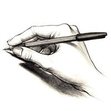Just what do I do?
I was asked this at a networking event I attended last week. There were about thirty of us in the room, milling around, putting out feelers for business and sometimes searching for a supplier/service provider to use for our own purposes, and almost every person I spoke to asked me this question. It wasn't mean, or malicious; they weren't impugning me or putting me down as being unable to do a job – they were genuinely curious. Most, it seems, had never encountered somebody in my line of work before.
Do you know what I do? I assume you have some idea as you are reading the blog on my website, but let me go into a little more detail for you. To put it briefly, I am an author, a proofreader and an editor – but this only just scratches the extent of the work that I do. Proofreading is fairly simple – that's just looking for mistakes, right? It's checking spelling and making sure there are no errors. It's easy, Microsoft Word even does it for you.
Wrong!
A proofreader does look for spelling mistakes, that's true, but they do a lot more on top; things that no computer can do. A proofreader will check that you have used the words that you mean to use; they will ensure that what you have written makes sense, and if they are good at their job they will check that it is correct too. The obvious group of people to use a proofreader are writers – everybody makes mistakes and nobody wants to see a book in print with bad spelling etc, so publishing houses hire proofreaders to try to weed out all those niggling little slipups. They aren't the only ones though; can you imagine the havoc that could occur if a lawyer drafted a contract and there was a mistake in it? Adding or subtracting the right word can change the meaning of an entire paragraph. Legal documents must be absolutely correct. So that's work for a proofreader.
Websites too – the big brand companies stand to lose a lot of money… and even small businesses can be affected if their website is riddled with mistakes. Again, work for a proofreader. So that's one part of my job. The next is editorial work; this involves taking existing content (sometimes called copy) and looking at its strengths, its weaknesses, its flow and style, and working to improve it. Again, newspapers and publishing houses are the obvious consumers of an editor's skills – but really any group or organisation that wants to make the most of their written materials should have an editor look over it. Editors have a profound understanding of how language works; the power of certain words and phrases, and how to elicit the most favourable response to a piece.
Which leads me to the final part of my descriptor: author. That is perhaps the easiest, and most difficult, part of my job to define. In short, I write – but I don't just write; I craft words, I massage meaning: I create symbols and ideas through careful construction of sentences. What do I write? Well, everything really. Just in the past six months I've written website copy, scripts, essays, short stories, sections of novels, self-help guides, blog posts, personal statements, job adverts and much more.
So, that's what I do… but can you guess what I said? Bearing in mind I often had only a few seconds to make an impression before they moved onto the next person they wished to speak to, so my words were carefully selected; I said, "I'm a Wordsmith. If you deal with the written word in any way, then you can benefit from my services." So far I've had emails from three people at that event enquiring further. I would call that a success.



